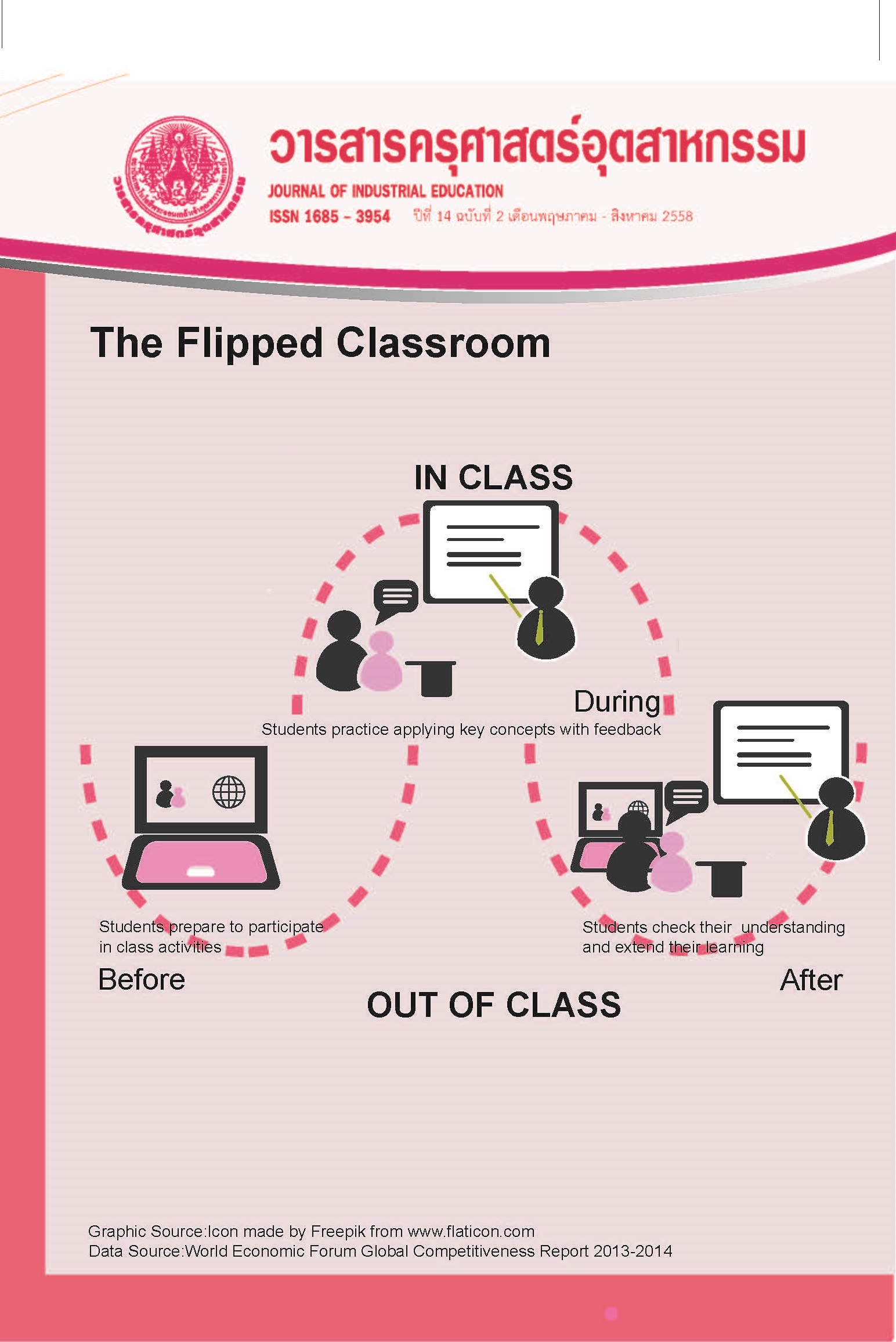Variable effecting disciplines in science e-Learning of students in Matthayombanbangkapi School, Bangkok
Main Article Content
Abstract
The objective of this research were to determine the disciplines the variables effecting on disciplines Prediction equation of disciplines in science e-Learning of students. Sample were 286 student who studied in the academic year 2013. They were selected by satisfied random sampling method. Environment of the media’s Questionnaire and Environment of the institution’s Questionnaire with reliability of .81 and .70 respectively, index of congruency between .80 - 1.00. Study habit’s Questionnaire and Achievement motion’s Study habit’s Questionnaire with reliability of .95 and .96 respectively, index of congruency between .80 - 1.00. Attitude’s Questionnaire with discriminations between 4.53 – 7.24, reliability of .96 and index of congruency between .80 - 1.00. The data were analyzed with means, standard deviation, multiple correlation and stepwise multiple regression. The research results were: student disciplines in science e-Learning at the most level. Disciplines in science e-Learning of students were positive correlation with attitudes toward the use of science e-Learning, Environment of the media, study habits, environment of the institution and achievement motivation. The statistical significant at .01 level, the value correlations were .766, .721, .675, .673 and .642 respectively. The variables effecting disciplines in science e-Learning were attitudes toward the use of science e-Learning(X3), Environment of the media(X1), study habits(X4), environment of the institution(X2) and achievement motivation(X5). The variable were 74.90 percent effected on disciplines in science e-Learning of students with the statistical significant at .01 level. The prediction equation were:
Prediction equation of disciplines in science e-Learning of students with raw scores was
Y = 0.335+0.268X3+0.216X1+0.151X4+0.122X2 +0.129X5
Prediction equation of disciplines in science e-Learning of students with standard scores was
Zy = 0.304ZX3+0.303ZX1+0.156ZX4+ 0.155ZX2+0.137ZX5
Article Details
"The opinions and contents including the words in papers are responsibility by the authors."
"ข้อคิดเห็น เนื้อหา รวมทั้งการใช้ภาษาในบทความถือเป็นความรับผิดชอบของผู้เขียน"
References
[2] สมหมาย วินทะไชย. 2552. ปัจจัยเชิงสาเหตุที่มีอิทธิพลต่อความมีวินัยในตนเองของนักเรียนชั้นมัธยมศึกษาปีที่ 4 จังหวัดร้อยเอ็ด. วิทยานิพนธ์การศึกษามหาบัณฑิต สาขาการวิจัยการ ศึกษาบัณฑิตวิทยาลัย มหาวิทยาลัยมหาสารคาม.
[3] กมล เรืองจุ้ย. 2554. ปัจจัยที่ส่งผลต่อความรู้และเจตคติเกี่ยวกับระบบอีเลิร์นนิ่งสำหรับการฝึกอบรมบุคลากรกรณีศึกษา:บริษัท พรอคเตอร์ แอนด์ แกมเบิล แมนูแฟคเจอริ่ง (ประเทศไทย)จำกัด. วารสารครุศาสตร์อุตสาหกรรม, 10 (ฉบับพิเศษ), 230-238.
[4] ปวิชญา ผาสุข. 2553. การศึกษาปัจจัยบางประการที่ส่งผลต่อความพร้อมในการเรียนรู้ด้วยตนเองของนักศึกษาภาคปกติ มหาวิทยาลัยราชภัฏสวนดุสิต. วิทยานิพนธ์การศึกษามหาบัณฑิต สาขาวิชาการวิจัยและสถิติทางการศึกษา บัณฑิตวิทยาลัย มหาวิทยาลัยศรีนครินทรวิโรฒ.
[5] จันทิมา แสงเลิศอุทัย. 2552. ปัจจัยที่ส่งผลต่อความมีวินัยในตนเองของนักศึกษามหาวิทยาลัยราชภัฏนครปฐม. วารสารศึกษาศาสตร์, 32(4), 47-53
[6] พรหมศิริ วงศ์ธนบัตร. 2555. ปัจจัยที่ส่งผลต่อความมีวินัยในตนเองของนักเรียนชั้นมัธยมศึกษาปีที่ 3 สังกัดสำนักงานเขตพื้นที่การศึกษาประถมศึกษากำแพงเพชร เขต 1. สารนิพนธ์การศึกษามหาบัณฑิต สาขาวิชาวิจัยและประเมินผลบัณฑิตวิทยาลัย มหาวิทยาลัยนเรศวร.
[7] กฤชอร รัศมีรัชกุล. 2555. ปัจจัยที่ส่งผลต่อความมีวินัยของนักศึกษาในสถานศึกษาสังกัดสำนักงานคณะกรรมการการอาชีวศึกษา จังหวัดพิจิตร. วิทยานิพนธ์การศึกษามหาบัณฑิต สาขาวิจัยและประเมินผลการศึกษา บัณฑิตวิทยาลัย มหาวิทยาลัยนเรศวร.

